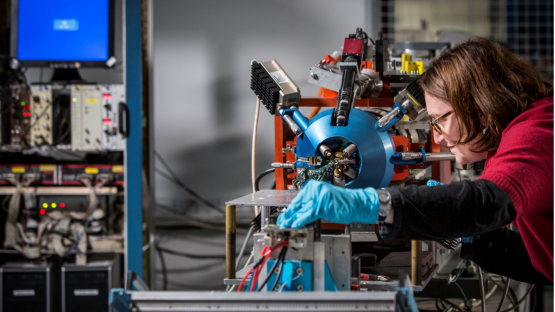Women account for less than 30% of the world’s scientists and researchers and this percentage is even lower in hard sciences, such as nuclear physics and chemistry. To help increase female representation in nuclear sciences and applications, the IAEA has launched a series of webinars to encourage women to pursue careers in this field.
The first webinar of the series, dedicated to careers for women in accelerator science and technology, was held on 24 February and attracted more than 300 participants. Four renowned female accelerator experts discussed why accelerators offer an exciting and a promising career path for women, and what is needed to increase female representation in this field. The recording of the webinar is available here.
The next webinar of the series will highlight careers for women in fusion, followed by events on radiopharmaceuticals, radiation technologies, isotope hydrology, nuclear data, research reactors and nuclear instrumentation.
Why consider a career in accelerator science and technology
Accelerators are among the most sophisticated pieces of scientific equipment in the world with numerous applications, including producing radioisotopes for drugs used to diagnose and treat cancer, helping experts characterize and preserve cultural heritage artefacts, modifying and creating materials used in space and quantum technology, and understanding the impact of climate change.
“Working with accelerators means you get to operate insanely powerful machines that are beautiful pieces of engineering, but you also get to work on inspirational projects with people who are passionate about what they do,” said Ceri Brenner, Leader of the Centre for Accelerator Science at the Australian Nuclear Science and Technology Organisation.
Most people working with accelerators today have backgrounds in nuclear physics or nuclear engineering, but there are many other disciplines, such as chemistry or biology, which can lead to a career with accelerators. Karen Cloete, Senior Researcher at the University of South Africa with a background in biology, for example, applied accelerators to investigate if microorganisms growing on plant roots transfer nutrients to the plant.
“By exploring materials down to the atomic level, experts can discover many new things with the help of accelerators, which is a fascinating feeling, and you can chose to work in the area you feel passionate about,” said Aliz Simon, Accelerator Specialist at the IAEA.
Accelerators can lead to a truly international career path with opportunities to collaborate with people from all over the world and to travel to international conferences and accelerator facilities around the globe. They can also offer different career trajectories — from national laboratories and international organizations to the private sector and academia.
“Accelerator science has by default an international character,” said Melissa Denecke, Director of the IAEA Division of Physical and Chemical Sciences. “It is a fantastic place for women in science to gather momentum and drive the progress on gender equality.”
Having the right support is key to achieving gender parity
Having female role models in senior positions, providing mentoring for female experts at the workplace and through professional networks, and popularizing and normalizing the image of women in nuclear science are key to increasing female representation in nuclear physics and nuclear engineering in general, and accelerator science and technology in particular, was the underlining message from the panel discussion.
“There is a lack of diversity and inclusivity in many scientific disciplines, but this can be changed by establishing the right networks and policies to let the voice of female experts be heard,” said Cloete.
“By amplifying each other’s messages as female scientists, we will go much further than doing things individually, and this is where organizations such as the IAEA can play an important role,” added Melanie Bailey, Reader in Forensic and Analytical Science at the University of Surrey.
Getting the right support through mentoring programmes and professional networks is important not only in early career stages but also in senior positions, where female representation is even lower.
“Society puts expectations that leadership positions do tend to go to white men, and when you come along as a woman, that can often be surprising to some,” said Brenner. “This is why sometimes you feel like you have to overly impress to meet the same level of expectations that a male colleague would have.”
Providing workshops to develop leadership skills, confidence and resilience trainings and mentoring programmes for women are essential to increase the representation of female leaders in this field, highlighted all speakers at the webinar.
Watch the IAEA Women Leaders Share Their Journeys on International Women’s Day 2021: Panel Discussion on 8 March 2021, which will discuss the role of women in leadership positions in nuclear sciences and applications.
Find out more about the applications of accelerators on the IAEA Accelerator Knowledge Portal.
Accelerator science has by default an international character. It is a fantastic place for women in science to gather momentum and drive the progress on gender equality.







